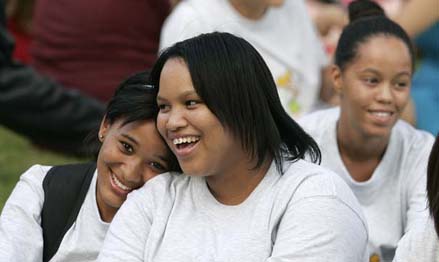|
 |
"Welcome to Kovsieland! The time of your life has just begun."
With these words Prof Jonathan Jansen, Vice-Chancellor and Rector, welcomed thousands of new first-year students. They attended a welcome ceremony with parents and guardians on the Bloemfontein Campus.
The arrival of first-year students saw the campus come to life, with the area in front of the Main Building turned into an open-air venue. A festive atmosphere prevailed, with live music filling the air and residences camping on the grass surrounding the area. Those who came out to welcome the new first-years, included members of the rectorate, the deans of all seven faculties and the student leadership.
"You are the smartest in the country," Prof Jansen told the new Kovsie students, informing them that thousands applied, but did not make it because of limited space. "We took the best students," he informed the large crowd, telling them that the more than 4 000 new Kovsies come from all over South Africa and the continent.
"This university is about high academic standards for its staff and its students. This is a place where we respect people, irrespective of where they come from, how they pray and how they love," Prof Jansen added.
Prof Jansen brought laugher to the audience, sharing tips for first-years from senior students, among them jewels like, "Wear flip-flops in the shower, you never know what the science students left behind" and "Don't keep your boyfriend back home, you never know what you will get at the university."
Phiwe Mathe, SRC President of the Bloemfontein Campus, added to the list of tips, telling first-years to have a hunger for knowledge and be open minded. "Participate in life on campus and ask important questions," he urged them. "There is plenty to learn at this university. "
Here is an idea where our students come from:
Eastern Cape: 395
Free State: 1701
Gauteng: 632
KwaZulu-Natal: 692
Limpopo: 333
Mpumalanga: 211
Northern Cape: 313
North-West Province: 243
Western Cape: 171